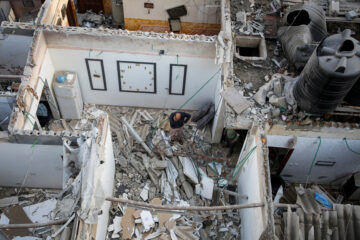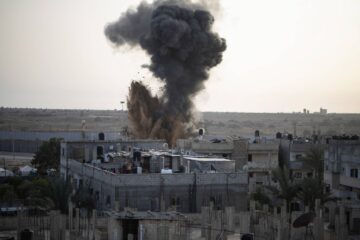Bahrain police fire tear gas as protests mark uprising
Bahraini police fired tear gas to disperse hundreds of Shiite protesters who took to the streets Saturday on the fourth anniversary of an uprising that deeply divided the key US ally.
Police deployed heavily as men and women carrying Bahrain\’s red and white flag alongside portraits of detained activists chanted "Down Hamad", in reference to the Sunni king, witnesses said.
They fired tear gas and sound bombs after beefing up security around several villages and along major roads across the country, the witnesses said, without reporting any casualties.
The opposition said on Twitter however that the police fired buckshot, and posted pictures of wounded protesters. It also said several activists were arrested.
The security measures were aimed at keeping the demonstrators out of central Manama, where the 2011 uprising was focussed.
Protesters burned tyres and used rocks, garbage containers and branches to block roads in the villages.
The radical February 14 Coalition, a cyber youth group, had urged demonstrations and strikes across the kingdom under the slogan "Strike of Defiance".
But the public security chief, Major-General Tariq al-Hassan, had issued a stern warning against the protests.
"Action will be taken against those who spread terror among citizens or residents, put the safety of others at risk or try to disrupt the nation\’s security and stability," he said.
Bahrain\’s Saudi-backed Sunni Muslim authorities crushed protests led by its majority Shiites shortly after they erupted on February 14, 2011, taking their cue from Arab Spring uprisings in the Middle East and North Africa.
Home to the US Fifth Fleet, Bahrain sits across the Gulf from Shiite-dominated Iran.
It is also one of several Arab states that backs US-led air strikes against the Islamic State group in Iraq and Syria, making it a vital Western ally.
Tensions are running high in the kingdom where a sectarian divide is deepening and there is a growing gap between the Sunni minority government and its mainly Shiite opponents.
The opposition is demanding a "real" constitutional monarchy with an elected prime minister independent of the ruling royal family, but the Al-Khalifa dynasty has refused to yield.
Shiite opposition leader Sheikh Ali Salman is behind bars for allegedly trying to overthrow the regime.
His arrest on December 28, shortly after he was re-elected head of Bahrain\’s main opposition party Al-Wefaq, has sparked near-daily protests in Shiite villages.
Attacks targeting security forces have also increased.
"The movement has reached its four years with the situation only getting worse and deteriorating with citizens threatened by losing their nationalities any minute," Al-Wefaq said on Twitter.
Bahrain has revoked the citizenships of scores of activists over the past few years, drawing condemnation from human rights groups.
In October, a court banned Al-Wefaq for three months for violating a law on associations.
"There looks like little hope of progress in Bahrain. The opposition is barely legal," said Neil Partrick, a Gulf analyst at the Royal United Services Institute for Defence and Security Studies.
The political rivals have struggled to bury their differences through a "national dialogue" that fell apart despite several rounds of negotiations.
Al-Wefaq refused to resume talks with the authorities in September despite a new proposal by Crown Prince Salman bin Hamad al-Khalifa.
And in November, the opposition boycotted parliamentary elections in which pro-government Sunnis won the most seats.
Al-Wefaq described February 14, 2011 as the start "of the peaceful movement… demanding a democratic nation in which the people will be the source of powers and which is built on partnership and equality".
It insisted that "peaceful" protests must continue "until a political solution is reached".
But a solution appears remote in the smallest Gulf Arab country, a neighbour of the absolute Sunni monarchy and regional powerhouse Saudi Arabia.
"Despite an interest in intra-Bahraini talks, the Saudi leadership seems to be allowing harder-line elements in the Bahraini ruling family to dictate the political direction of the country," said Partrick.
On Monday, Manama permanently closed Alarab News Channel whose programming was interrupted on February 1 just hours after it launched and aired an interview with a Shiite opponent of Bahrain\’s rulers.
SOURCE: AFP
[do_widget_area inner_adsbar]











